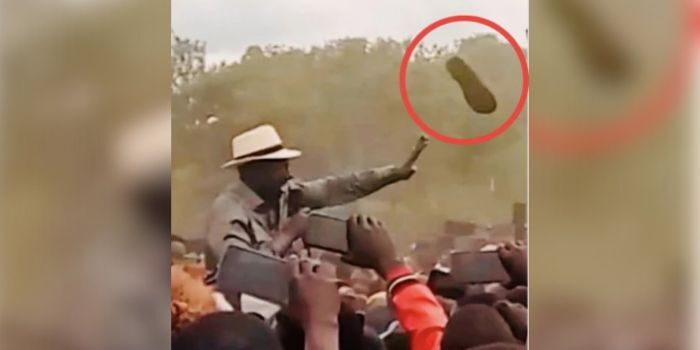Suspects Accused in Ruto Shoe Attack Break Their Silence
Three young men accused of being involved in the dramatic shoe-throwing incident targeting President William Ruto during a public rally in Migori County have now spoken out, firmly declaring their innocence.
In an exclusive interview with NTV, the suspects denied any involvement in the act, insisting they did not throw a shoe at the Head of State. Their statements come just weeks before their case is mentioned in court on June 26.
The incident occurred on Sunday, May 4, during President Ruto’s address to the public in Kehancha town, Migori County. As seen in a widely circulated video on Newshub.co.ke, the President was speaking about his efforts to lower the cost of living when a shoe suddenly flew in his direction.
In a quick reaction, Ruto raised his arm and deflected the object just before it could hit his head, surprising his security team and forcing a brief interruption of his speech.
The shocking moment was captured on camera and quickly went viral, sparking nationwide discussion and concerns over the President’s security. Police responded swiftly by launching an investigation into the matter.
They began by rounding up 16 young people from the area believed to have been in the vicinity during the event. After further interrogation and investigation, the number of suspects was narrowed down to four, who now face the possibility of facing jail time or heavy fines if convicted.
One of the accused told NTV that he was being wrongly accused, saying he wasn’t even at the rally when the shoe was thrown. Backing his claim, his father said that if his son had been present at such an important event, he would have definitely taken photos.
“I’m sure that if my son had attended the rally, he would have at least taken a picture. There is no such photo, which means he wasn’t there,” the father explained.
Another suspect’s family also strongly defended their son, an 18-year-old, questioning the evidence linking him to the attack. The father pointed out that the shoe seen flying toward the President in the video didn’t match any footwear in their home.
“My son doesn’t even own a shoe like the one I saw online. That shoe has never been in my house. So where would he get it from?” the father asked, implying that the accusation was baseless.
A third suspect told reporters that he couldn’t have been involved in the incident because he was working in the mines at the time of the President’s visit to the area.
“I never even saw the President. I don’t know how many helicopters he came with or what time he arrived. I was busy working in the mining fields,” he said.
Interestingly, there were already signs that President Ruto’s security could be compromised even before the shoe was thrown. His platform was unusually close to the crowd, and there appeared to be limited space between him and the public.
Footage captured from inside the gathering also showed a restless and energetic crowd. People could be seen moving around and talking as the President addressed them, suggesting that the atmosphere was far from calm and secure.
The shoe attack has not only raised questions about crowd control and presidential security at public events but has also drawn attention to the pressure young people in areas like Migori are facing—many of whom feel ignored or frustrated by the current economic conditions.
As the court date approaches, the nation waits to see whether the suspects will be cleared or held accountable for what could have been a dangerous breach of presidential safety.
Join Gen Z New WhatsApp Channel To Stay Updated On time https://whatsapp.com/channel/0029VaWT5gSGufImU8R0DO30


